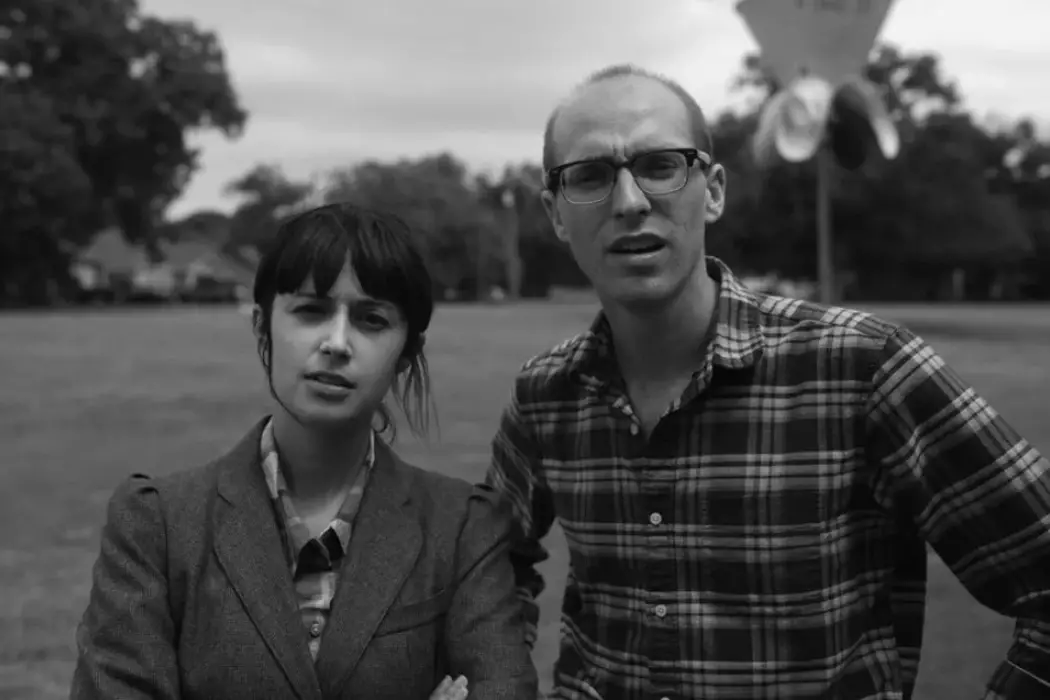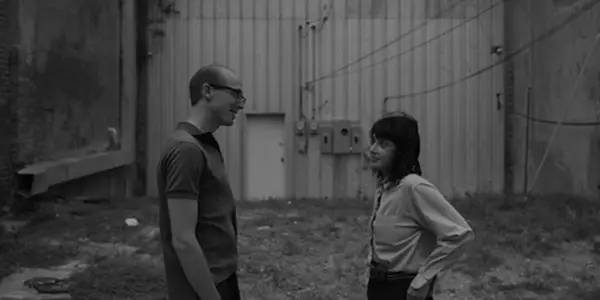Slamdance Film Festival 2024: Interview With Co-Writer/Director Pete Ohs

Kristy Strouse is the Owner/Editor in Chief of Film Inquiry,…
Pete Ohs has been making hilarious and inventive indie films for years; his newest, Love and Work, tackles a new subject with his familiar style. I spoke with the co-writer/director about the film, his unique working style, and how, sometimes, just going for it is the best way!
This interview has been edited for clarity.
This is Kristy Strouse from Film Inquiry. Congrats on the movie. I really enjoyed it!
So, let’s talk about Love and work. Where did this idea come from? And are you always trying to do something different with each film?
Pete Ohs: Yeah. So, this one came from the space, from that empty warehouse where the shoe factory takes place. That space was like this hundred-year-old building in Corsicana, Texas, where there’s this lovely artist residency called 100 West, where I had done a month-long writing residency back in 2016. And then I just became friends with the people who run that organization, and over the years, I would just stop in and say hi or do a screening of things when I make them. And one of my visits in maybe February 2021, they had acquired this new old space, and they got it to provide to artists to use it as a studio and an exhibition space. And to me, they said, if there’s anything you would want to do with this, let us know. And so, I immediately started to imagine what I would do with that space? And the initial image was some sort of, like, some sort of shoe factory in the 1920s, where there’s like an assembly line of people making boots for the war effort or something. Then I took that little bit of a kernel of an idea to Stephanie Hunt, who lives in Austin, and shared about this space, showed her pictures of it, and told her about this factory idea. I’ve also just watched a new Adam Curtis documentary. He’s always kind of exploring what’s gone wrong with this society and what lessons we can learn from, like past mistakes. And just from that conversation with Stephanie, we arrived at this idea of a factory that doesn’t make anything, which just made us laugh. Also, reflect on what the last year and a half of our lives were, where we just lived through this pandemic, we were probably still getting the government stipend from COVID. And that just put these thoughts around, “What are we doing with our time? What are we like, we don’t have to work? What does that mean? Does that feel good? Does that feel bad?”
So, all these concepts are discussed and explored through initial conversations with Stephanie. I think the genre-switching that I have been doing is one, it’s just kind of like an internal reaction within myself; after I do one thing, I just want to try something different. Along those same lines, I’m always looking to experiment, take risks, and do something that I’m not sure will work, making it more exciting and worth doing. The nature of these small movies is that there’s little at stake. If I’m spending $150 million, you better believe I will make the same Marvel movie again because I need to make sure it makes that money again. But when you’re doing it kind of small with low stakes, the point is to take risks. So that’s kind of why I’m always looking to do something that isn’t exactly like the thing I had done before. And then, at the same time, I’m still me. So it will still have my sense of humor and sensibilities. There are still things I will do again because I can’t help it. After all, I am who I am. There’s so much amazing stuff there that I want to dissect.
Just out of curiosity, do you feel like it’s a little bit freeing to have a smaller film in a smaller space versus the pressure of something if you were to get a Marvel or something like that?
Pete Ohs: The reason I’m making movies this way, and have been for the last few movies, is in response to my experience in my first film, which was still a small film but had a $200,000 budget, which is a lot of money to me, and still is. From that experience, I felt it became less fun. I make movies because it was fun when I was 15, so I’m always trying to recreate that feeling again. If I could recreate a feeling, it would be being seven years old and waking up on Christmas morning to a tree with presents underneath, you know? That would be the number one feeling. But the next best feeling was making videos with my best friend in middle school.

I love that. Was there a movie that you saw when you were 15? Or, you know, you opened it up as a gift that was like, man, I need to do this?
Pete Ohs: Yeah, I mean, for a long time, and even now, I identify as a filmmaker. But I wasn’t a kid dreaming of being like a little Spielberg. Of course, I love Jurassic Park and those movies, but I was more into making videos. It wasn’t like, “I make films.” It was more like, “I get together with my friends with a video camera, and we’re just trying to make each other laugh and then watch the videos we made.” I have watched The Matrix and Back to the Future many times; it’s probably still my favorite movie. But you often hear about film directors who were like little mini directors when they were ten years old. I was never quite that way. It was more about the activity with friends, which was a pleasurable experience for me.
I like that. I just recently had someone who said a story came from a space that was given to them to use. And then they just made a story out of it. And I was like, should that be something I look for? Should I try to find places and see where that takes me? Like, is that good advice for people? Because it’s very interesting.
Pete Ohs: I mean, that’s what I’ve done for the last four movies, and I like it. I like this way of doing it, especially for filmmaking. There are so many logistical problems you eventually encounter, like finding the right location. If you start with a location, you don’t even encounter those problems; the solutions are already there. Even within the writing process, you can respond to the space. You’ll write some cool hallway scenes if there’s a cool hallway. But if you’re sitting in your room trying to imagine that stuff, and you write a cool hallway scene, and then you eventually find a house, you need to find a house with a cool hallway. Is the hallway that important to you? It’s a cool idea but not necessarily the most important thing. I feel like if I drop into any space with my creativity, with the creativity of my collaborators, we will come up with ideas. We humans are like idea-making machines. So, especially for low-budget filmmaking, you will avoid many headaches just by starting with a narratively inspiring location.
Yeah, I think that’s also a fun way to do it, but I don’t know. See if that percolates some inspiration.
Pete Ohs: It puts you in a box like it puts me in a sandbox. Sandboxes are made for playing in. I have no problem being put inside of a box. It’s a sandbox. And so accept that fun challenge of being here’s a thing: What would you do with it?
I think that’s awesome. I think that it’ll be fun for people to hear that. So the movie’s in black and white. Was that something that you kind of always envisioned it as? Did you maintain the sensibility of it being like an older feel? Is that why?
Pete Ohs: Yeah, I mean, certainly that initial image of these 1920s factories, all black and white images as you start to Google that. But then what we were talking about was certainly very present—it’s pandemic stuff, union strike stuff, AI stuff. It also felt futuristic, discussing a world where AI has gotten to the point of doing everything for us. Since we’re a low-budget movie, we won’t go the futuristic route straight into the future. It felt like, let’s set this in an alternate path. Black and white was the perfect way to differentiate the story from our current experiences.

Yeah, I think it was a terrific idea. And I think in a lot of ways, the simple work that they’re doing is also sadly, what would probably happen and what we would yearn for in the future, if you can even call it that. The cast is great. Can you tell me how you brought them together?
Pete Ohs: Yeah, I mean, Frank Mosley, I had not worked with him before, but we met at FILMFORT in Boise. He was there with a short that he co-directed and starred in that I loved and also we had lots of mutual friends. And then both Will Madden and Stephanie Hunt I had the pleasure of working with separately on previous movies so it was exciting to bring together these two “veterans” of my very specific and unique filmmaking process to create something new together. Alexi Pappas is a friend and I had edited two features for her so she got pulled in and then John S. Davies is this incredible retired Shakespearean actor living in Corsicana who we connected with on the first days of the shoot then created that role for him. Filmmaking is already collaborative but the way I make movies is perhaps even more collaborative than usual so I’m deeply grateful and lucky to have these actors involved and engaged in the making of these movies.
Yeah, that’s fantastic. It’s just fun to see that kind of collaboration, especially how everyone plays off each other. So, what’s next? I’ve enjoyed the last few, so what’s up next?
Pete Ohs: I’m already in post on a new feature that I shot last year in western Massachusetts. It involves returning collaborators but also some fresh actors to the mix. It’s once again another strange genre experiment that probably will feel more similar to JETHICA in terms of tone. I’m also in post on a feature I didn’t direct but that I helped make using my same process. It’s a new film from one of my favorite people and creators, Albert Birney, who made STRAWBERRY MANSION. As always, it’s a pleasure and joy to collaborate with good, nice people.
Thank you for speaking with me. I hope that it gets all of the accolades that it really should. Because I think it’s fantastic.
Pete Ohs: Thank you. Thank you so much. I appreciate you taking the time to watch it and chat with me about it. Yeah, it means a lot.
Absolutely. Have a great rest of your day!
We want to thank Pete Ohs for taking the time to speak with us.
Does content like this matter to you?
Become a Member and support film journalism. Unlock access to all of Film Inquiry`s great articles. Join a community of like-minded readers who are passionate about cinema - get access to our private members Network, give back to independent filmmakers, and more.
Kristy Strouse is the Owner/Editor in Chief of Film Inquiry, writer, podcaster, and all around film and TV fanatic. She's also VP of Genomic Operations at Katch Data and is a member of The Online Association of Female Film Critics and The Hollywood Creative Alliance. She also has a horror website: Wonderfully Weird & Horrifying.












